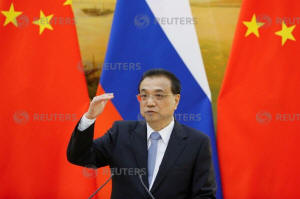|
China calls for open world economy but
work remains on landmark trade pact
 Send a link to a friend
Send a link to a friend
 [November 12, 2018]
By John Geddie and Manuel Mogato [November 12, 2018]
By John Geddie and Manuel Mogato
SINGAPORE/MANILA (Reuters) - China will
further open its economy in the face of rising protectionism, Premier Li
Keqiang said as he arrived in Singapore on Monday for meetings with
Asia-Pacific leaders that will focus on speeding up work on a major new
trade pact.
Li's remarks in an article in Singapore's Straits Times newspaper came
as Singapore's Prime Minister Lee Hsien Loong called for more regional
integration, saying multilateralism was under threat from political
pressures.
"China has opened its door to the world; we will never close it but open
it even wider," Li said in the article, in which he called for an "open
world economy" in the face of "rising protectionism and unilateralism".
He did not directly refer to China's bruising trade war with the United
States.
Notably absent from this week's meetings is U.S. President Donald Trump,
who has said several existing multilateral trade deals are unfair, and
has railed against China over intellectual property theft, entry
barriers to U.S. businesses and a gaping trade deficit.

Vice President Mike Pence will attend instead of Trump, and Russian
President Vladimir Putin, Indian Prime Minister Narendra Modi and
Japanese Prime Minister Shinzo Abe are among those also expected to join
Li and the ten-member Association of Southeast Asian Nations (ASEAN).
It was not clear if Li and Pence will hold separate talks on the
sidelines of the meetings, which would be a prelude to a summit
scheduled between Trump and Chinese President Xi Jinping at the end of
the month in Buenos Aires.
The encounter, if it happens, would come on the heels of high-level
talks in Washington where the two sides aired their main differences but
appeared to attempt controlling the damage to relations that has
worsened with tit-for-tat tariffs in recent months.
Li said China would "work with all relevant parties to expedite"
negotiations on the Regional Comprehensive Economic Partnership (RCEP),
showcased to be a free trade deal that will encompass more than a third
of the world's GDP.
[to top of second column]
|

Chinese Premier Li Keqiang attends a joint news conference with
Russian Prime Minister Dmitry Medvedev (not pictured) at the Great
Hall of the People in Beijing November 7, 2018. REUTERS/Thomas
Peter/Pool

The pact includes 16 countries, including ASEAN nations, Australia,
China, India, Japan, New Zealand and South Korea, but not the United
States.
Regional diplomats said substantial work had been done on the trade
deal, but it was not likely to be fully concluded until next year.
"During the summit, the leaders would express their commitment to
conclude the negotiations, because this is very important for the
region especially in view of rising trade tensions," Junever Mahilum-West,
a senior official in the Philippines foreign ministry, told
reporters last week.
The draft of a communique to be issued by RCEP nations later in the
week, which was reviewed by Reuters, said the group would instruct
"ministers and negotiators to work toward the full conclusion of the
RCEP negotiations in 2019".
Earlier, in remarks at a business summit on Monday ahead of this
week's meetings, Singapore's Lee said:
"ASEAN has great potential, but fully realizing it depends on
whether we choose to become more integrated, and work resolutely
toward this goal in a world where multilateralism is fraying under
political pressures".
Lee has previously warned that the U.S.-China trade war could have a
"big, negative impact" on Singapore, and the city-state's central
bank has warned it could soon drag on the economy.
Also on Monday, the ten-member ASEAN group reached its first ever
deal on e-commerce aimed at helping boost cross-border transactions
in the region.
(Reporting by John Geddie in SINGAPORE and Manuel Mogato in MANILA;
Editing by Raju Gopalakrishnan)
[© 2018 Thomson Reuters. All rights
reserved.]
Copyright 2018 Reuters. All rights reserved. This material may not be published,
broadcast, rewritten or redistributed.
Thompson Reuters is solely responsible for this content. |